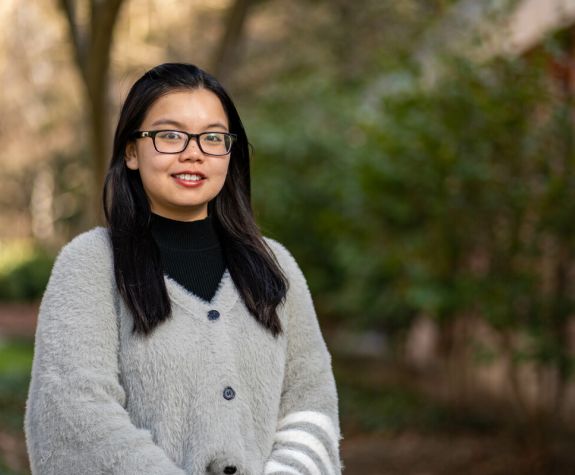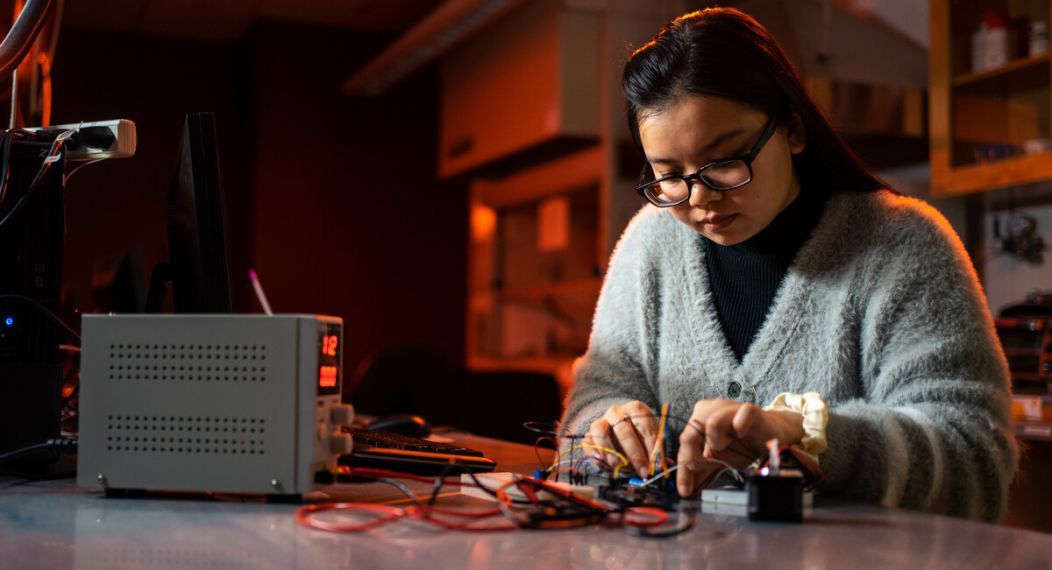
Major: Bioengineering
Graduation Year: 2023
Hometown: Ho Chi Minh City, Vietnam
Extracurriculars: Society of Women Engineers, Biomedical Engineering Society
Jenny Vo traveled from Vietnam to California to study bioengineering at Pacific. She was attracted to Pacific because of the Cooperative Education program (CO-OP) and has since completed an eight-month internship at Abbott Laboratories, working on medical devices in the heart failure unit. While she says she experienced culture shock when she first came to the U.S., Jenny says she now feels “at home” on campus and has found a tight-knit, supportive community in the bioengineering program.
Why did you choose to pursue bioengineering?
I think bioengineering is really interesting because it is a multidisciplinary field where you are combining your knowledge of biomedicals with engineering tools, such as computational or coding. And then you combine these skills to solve problems that benefit patients or create medical devices that improve the healthcare system. It’s a really fun field because you have a lot of space for your creativity.
Why did you choose Pacific’s bioengineering program?
I'm an international student from Vietnam. When I was in high school, I received an offer from Pacific for a scholarship because of my robotics competition. At that point, I was still deciding between going to college in Europe or the U.S.
I looked up Pacific and I found that they had something called CO-OP, which I didn’t understand. I knew that if you went to college you could do an internship during the summer, but the idea of the CO-OP stood out to me because it would give me the chance to work in a full-time position for eight months and learn how an industry operates.
So, I did more research about CO-OP, and found that Pacific is one of only a couple schools that offers a CO-OP experience that you get credit for. I decided: “Okay, I’ll give the school a try.” And now I go to Pacific!
Tell us about your CO-OP experience.
I did my CO-OP at Abbott. I worked in their heart failure unit. They taught me how medical devices are made, like what the FDA is and what they are looking for when approving products. It was totally different from a day in my life as a college student. They took me seriously as an engineer and gave me a lot of tasks. I was basically solving problems day-to-day, which I really liked, so it gave me the sense that what I’m doing is right for my interests. It was really fun and I learned a lot from it.
How did Pacific help you prepare for your CO-OP?
First, the classes Pacific offers. In bioengineering, we’re divided into different study paths. I chose bioelectrical, which really helped me when I was going into my CO-OP because I got some background in electronics through the classes I took. Those classes helped me to understand some aspects of products I worked on in my CO-OP.
Plus, I would give a big shout out to Dr. Camy. She mentored us through the process of how to apply for CO-OP in the ENGR 25 Professional Practice Seminar. This class helps you develop your resume and cover letter. You also do a lot of mock interviews so that you have a chance to practice and make mistakes along the way, so when you go to a real-life interview, you will be more confident and express yourself better to the employer.
Is there anything that surprised you about Pacific?
As an international student, the first couple semesters were quite a shock in terms of the culture and language barriers. But I think because of how Pacific has a lot of ongoing events or groups doing different activities, I feel at home—even though I’m far away from my home and family to study here. It’s a lot of fun on campus because it’s a small-sized school, so everyone knows each other. I don’t feel scared or isolated from the group anymore.
What extracurricular organizations are you involved in on campus? How have they enhanced your experience here?
I’m a part of the Biomedical Engineering Society. In BMES, we try to bring a lot of project ideas to the team so that we can brainstorm and do engineering problems together. The group is really supportive.
I’m also in the Society of Women Engineers. They’re a good connection for someone like me, a woman engineer trying to be in a field that not a lot of women are studying. SWE supports us by hosting events like lunches with industry leaders, where we ask them about their experiences and how they can help us succeed in the future.
What advice do you have for incoming students?
Don’t be shy. Go and talk to your professors. They are really friendly and will make you feel welcome.




